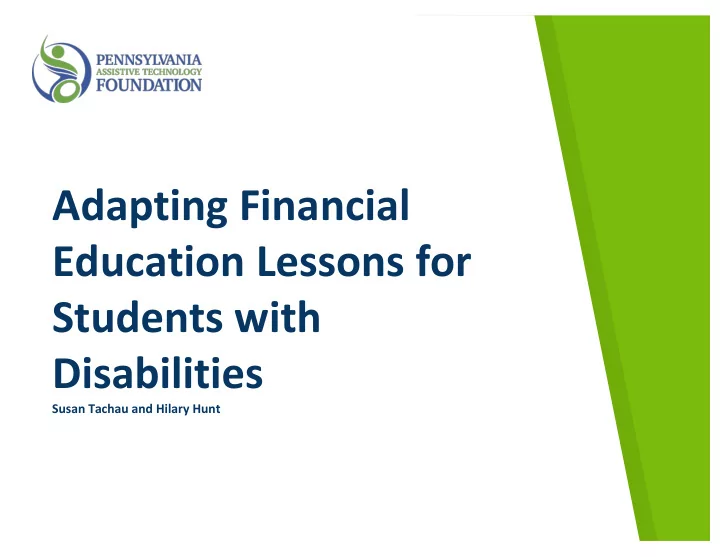

Adapting Financial Education Lessons for Students with Disabilities Susan Tachau and Hilary Hunt
1st - The “Why” 2nd - The “How”
5 Reasons to Adapt
5 Reasons 1. Asset limits for government benefits 2. Disability-specific needs 3. Role of personal and financial caregivers 4. Special assistance programs 5. Unique family circumstances
1.Asset Limits for Government Benefits What are asset limits ▸ Examples of asset limits ▸ What counts as an asset ▸ How this impacts saving habits ▸ Re-think your “Pay Yourself First” lessons ▸ Understand new programs (ABLE) that help people ▸ with disabilities save for their future
2. Disability-Specific Needs Can the student handle their money without physical ▸ assistance? Will the student be able to understand complex issues? ▸ Is the student naive or susceptible to influence? ▸ Does the student have a hard time being organized? ▸ Does the student have a sensory disability (hearing or ▸ vision) that makes accessing information more difficult?
3. Role of Personal or Financial Caregivers Assistance with: ▸ Daily living ▹ Paying bills ▹ Managing accounts ▹ Entering into contracts ▹ Financial caregiver ▸ Representative payee ▹ Guardianship ▹
4. Special Assistance Programs Home and Community-Based Waiver programs ▸ Workforce Innovation and Opportunity Act (WIOA) ▸ Social Security Work Incentives ▸ Achieving a Better Life Experience (ABLE) Act savings ▸ account
5. Unique Family Considerations Parents lack information about programs and supports ▸ Parents dependent on federal or state benefits tied to ▸ student’s disability Questions about ongoing support ▸ Debates over decision-making (representative payee, ▸ guardianship, Power of Attorney)
Tools for Educators
studymoney.us
Cents and Sensibility ● PDF online ● Limited hard copies
Coming Soon! The Educator’s Guide ● Chapter-by-Chapter Resources ○ Essential Questions ○ Standards Correlation ○ Background Information ○ Teaching Strategies ○ Companion Slides
Need or Want? Decide if each item is a need or a want.
CLOTHES
VOICE ACTIVATED DEVICE
The Impact of Saving Limits
Saving Limits ▸ How much can be saved before losing or decreasing benefits? ▸ What assets are counted? ▸ Are there any exceptions?
Options for Saving
Options for Saving ▸ Plan to Achieve Self-Support ▸ Special Needs Trusts ▸ Individual Development Accounts ▸ Achieving a Better Life Experience Accounts
Plan to Achieve Self-Support (PASS) ▸ For people who plan to work or are working ▸ Offered through the Social Security Administration ▸ Save towards an item or service needed for a work goal (transportation, technology)
Special Needs Trust ▸ Family member or friend may establish a trust on your behalf ▸ Family members or friends can deposit money ▸ Can be used to pay for big expenses but not everyday ones ▸ Complicated - use a lawyer
Individual Development Accounts (IDAs) ▸ For saving towards a specific goal ▸ Money put into account is matched ▸ Have requirements including regular contributions and taking classes on managing your finances
Achieving a Better Life Experience (ABLE) ▸ For people who acquired their disability prior to age 26 and qualify for Social Security income (SSI) ▸ Can save up to $14,000 each year ▸ Use for disability-related expenses ▸ Doesn’t count toward SSI or SSDI saving limits
Assistive Technology Chapter 7
Role of the Educator DO... DON’T... Advocate for the student to receive Ask for personal financial information financial education. from either the student or parent/guardian. Give impartial and complete Provide personal opinions about information on a wide range of financial financial topics or give financial topics. advice. Provide opportunities to practice Request a student’s credit report or completing financial forms using sample assist in the completion of tax forms. data. Give students tools to help them engage Require parents to talk about financial family members in financial matters with their students. conversations. Help connect students and their families Complete applications for assistance with support providers in the or financial products with the student. community.
Adapting Financial Education Lessons for Students with Disabilities Susan Tachau and Hilary Hunt
Recommend
More recommend